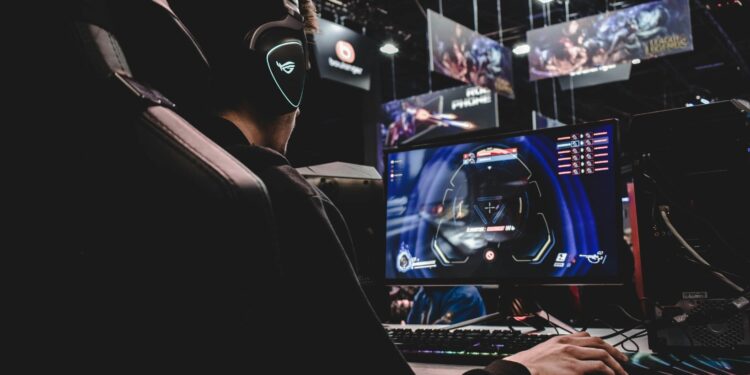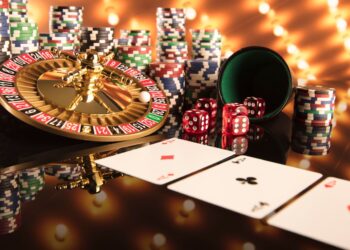In recent years, esports has exploded into the mainstream, turning gaming from a casual hobby into a legitimate career for many. You might not be aware of just how massive the industry is, but trust your game-enthusiast child definitely knows.
In fact, according to a Statista report, the global esports market is projected to grow over fivefold by 2032, reaching more than $10 billion. Suddenly, the idea of pursuing a gaming career doesn’t sound so far-fetched, does it?
With prize pools in the millions, it’s easy to see why young gamers are dedicating so much time to gaming. Pro gamers are becoming celebrities in their own right, adding even more appeal to the pursuit.
But here’s the tricky part: at what point does this dedication tip into something unhealthy? When does passion turn into compulsion? That’s the question we need to explore.
Understanding this distinction is crucial for the players and parents, partners, and friends who may worry about someone they love being consumed by gaming.
The Appeal of Esports: Gaming as More Than a Hobby
For many aspiring players, the allure of esports lies in the promise of a career doing something they love. Competing in games like Call of Duty, DOTA 2, or Fortnite can feel like a dream come true for many. The chance to turn a passion into a profession is an exciting prospect for aspiring gamers.
This excitement fuels players to spend hours every day honing their skills, watching tutorial videos, and analyzing professional matches. It’s dedication, hard work, and commitment- qualities we traditionally admire in anyone pursuing excellence.
Yet, in the case of gaming, the distinction between passion and addiction can sometimes be tricky to navigate.
Esports professionals often train 10+ hours a day, which can easily be mistaken for compulsive gaming by non-gamers. After all, practice is essential to success in any competitive field. But what happens when that dedication tips into something more damaging?
When Passion Becomes Addiction
Compulsive gaming is characterized by an inability to stop playing despite negative consequences. This can mean gaming late into the night, neglecting relationships, skipping meals, or missing responsibilities at work or school.
Unlike other hobbies, gaming often provides immediate gratification through rewards, leveling up, or completing in-game achievements. This constant cycle of reward and progress can make it easy to lose track of time and difficult to stop.
For some, the fine line between passion and addiction can be crossed without even realizing it. What may start as a desire to improve can evolve into a need-to-game where the drive to compete is no longer enjoyable but obligatory.
Alarmingly, video game addiction is on the rise, particularly among teenagers. A study in the journal Addictive Behaviors examined gaming habits among students. It found that over 19% of male students and 7.8% of female students in a sample of 3,000 were identified as having a gaming disorder. As the esports industry expands, these troubling statistics will likely continue to increase.
Those struggling with gaming addiction often describe feelings of anxiety, restlessness, or irritability when they’re not playing. These are red flags that the relationship with gaming may have become unhealthy.
The Role of Game Design in Fueling Compulsion
One of the factors that makes compulsive gaming so pervasive, even among esports hopefuls, is the design of the games themselves. Many popular esports titles are designed to keep players engaged for long periods. Features like ranked systems, loot boxes, and in-game rewards can create an addictive cycle of “just one more match.”
In ranked games, players are driven to climb the ladder, often leading to prolonged gaming sessions. After all, losing a match can lead to a drop in rank, and many players become obsessed with getting back on top. Combine this with in-game achievements and time-sensitive events that encourage frequent log-ins, and you have the perfect recipe for compulsive gaming.
However, this isn’t to say that game developers are entirely to blame. The competitive nature of esports encourages players to log as many hours as possible, much like athletes who spend years training for their sports. But unlike traditional sports, where physical limits often force rest, gaming lacks these natural stopping points.
This is particularly concerning for minors, who may struggle to understand their limits, leading to compulsive gaming behaviors from a young age. Recently, this issue gained attention through a legal action filed by parents in the video game addiction lawsuit.
According to TorHoerman Law, they allege that major companies intentionally designed their games to be addictive, especially for young players. Families are seeking compensation for the harmful effects of gaming addiction, which include mental health challenges, financial losses, and emotional distress. Plaintiffs contend that game developers have failed to adequately warn users about these risks, prioritizing profit over the well-being of vulnerable youth.
This concern is amplified by the fact that many of these games contain violent content, which can have a more detrimental impact on minors. A study reported by Charlie Health found that young people who played more than two hours of violent games daily showed greater depression symptoms. This was in contrast to those who played non-violent games.
In light of these concerns, there is a growing call for developers to implement built-in limitations for minors. This would help create a healthier gaming environment that encourages responsible play and prioritizes the well-being of young gamers.
How to Recognize Compulsive Gaming Behavior
For those striving to become professional gamers, it’s essential to recognize the signs of compulsive behavior before it spirals into something more serious. Here are a few warning signs to watch for:
- Neglecting responsibilities: Are you frequently late to work or school because of gaming? Are household chores, assignments, or other obligations slipping through the cracks?
- Sleep disruption: Are you regularly sacrificing sleep for a game? Sleep deprivation can lead to a host of health issues, from fatigue to weakened immune function.
- Social withdrawal: Do you cancel plans or avoid social situations to stay home and play? Compulsive gamers often isolate themselves from friends and family to spend more time gaming.
- Mood swings: Do you feel irritable, anxious, or restless when you’re not gaming? Emotional reliance on gaming as a source of comfort can indicate a deeper issue.
The key difference between passion and addiction often lies in the ability to take a break. Passion drives you to improve, but it’s still balanced with other aspects of life. Addiction, on the other hand, consumes your time and energy at the expense of everything else.
FAQs
What does the future of esports in the U.S. look like?
The esports industry in the United States shows no signs of slowing down, as suggested by a Statista report. The number of esports users in the country is forecasted to more than double, rising from under 32 million in 2020 to over 65 million by 2028.
What are the signs of compulsive gaming?
Signs of compulsive gaming include neglecting personal relationships, skipping meals, and sacrificing sleep. Poor academic or job performance often results as gaming takes precedence over responsibilities. Additionally, individuals may feel anxious, irritable, or restless when not playing, indicating a dependence on gaming that impacts their overall well-being.
When should I consider seeking help for gaming addiction?
If you or someone you know is struggling to control their gaming habits, it may be time to seek help. Many resources are available, from therapists specializing in gaming addiction to support groups like the Online Gamers Anonymous (OLGA). Recognizing the problem early can significantly help prevent severe consequences like academic failure, job loss, or relationship damage.
Overall, in the world of esports, the line between dedication and addiction can be difficult to see. While passion can drive success, it’s important to recognize when gaming begins to take over other aspects of life.
By staying mindful of the time spent gaming and recognizing the signs of compulsive behavior, aspiring esports professionals can pursue their goals healthily. This approach allows them to enjoy their passion for gaming without letting it become a source of harm.






















